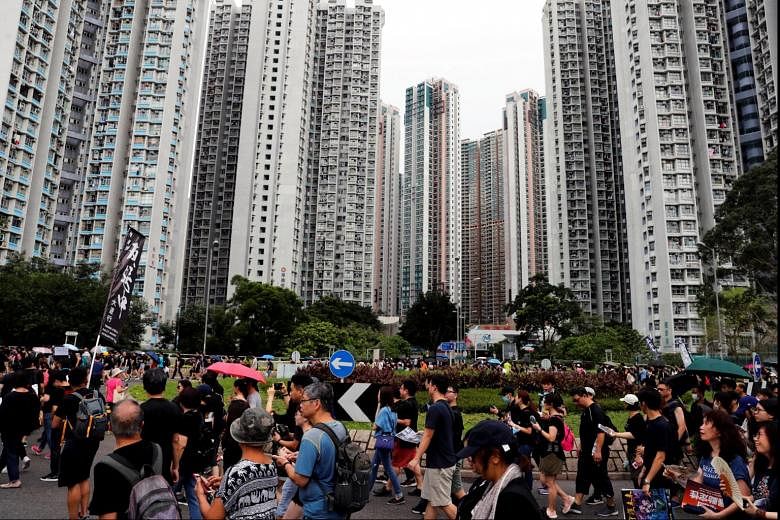HONG KONG - Hong Kong's government on Thursday (Oct 17) provided further details about new policies announced by Chief Executive Carrie Lam in a bid to ease the city's housing crisis, which includes seizing up to 400ha of land for public housing over the next five years.
Mrs Lam said on Wednesday that she would increase funding for temporary housing from the promised HK$2 billion (S$350 million) to HK$5 billion, build 10,000 transitional housing units in the next three years and seize up to 160ha of brownfield sites in the New Territories for public housing.
Brownfield sites refer to land plots that have previously been developed but are not currently in use. The ones in Hong Kong tend to be farmland in the New Territories damaged by small, polluting businesses like e-waste recycling.
Another 290ha, whose exact location is to be announced next year, will also be inspected for housing suitability.
"It is not realistic that all of the land (because of previous usage or location) would be suitable for public housing," said Secretary for Development Michael Wong.
He also defended the use of the Lands Resumption Ordinance for the land seizure, saying that it has often been used in the past to free up land for public facilities like roads and railways.
"There were judicial reviews in the past, but the government is very careful in our definition of public property," Mr Wong said.
He offered more details about the Land Sharing Pilot Scheme, a form of public-private partnership in which owners of plots not yet identified by the government can offer at least 70 per cent of their land for the government to build public housing or starter homes.
In the last year, the government had also converted 129 sites, Mr Wong said, which would translate to some 184,000 flats, and work on land for another 126,000 flats is under way.
Mr Wong also defended the government's compensation - HK$1,390 per sq m - as adequate since the land would be used for public housing, which is "not a high-value property".
Private landowners and developers had previously complained that the amount was insufficient.
Much of the land that the government is eyeing lies in the rural Northern Territories area, which is close to the Chinese border. Other plots include two squatter settlements on the Kowloon peninsula.
However, last month, members of the rural representation committee, the Heung Yee Kuk, warned Mrs Lam that they would oppose any developments in the New Territories, saying the government should not take it for granted that it would enjoy the support of villagers, who are largely pro-Beijing.
Much of the village land is either privately owned because of ancient inheritance rules or are in the hands of private developers.
Hong Kong has been gripped by four months of protests sparked by opposition to a now-shelved extradition Bill. The protests have since morphed into calls for democratic reforms.
The government is hoping to ease social tensions by resolving a long-time bugbear - housing.
Hong Kong's sky-high property prices have meant that many cannot afford to have their own homes in a city where income inequality is also one of the highest in the world.
On Wednesday, Mrs Lam also expanded borrowers' power by reducing the size of down payments required for home purchases.
Under the Mortgage Insurance Programme, borrowers can carry a loan-to-value (LTV) ratio of as high as 90 per cent on properties worth up to HK$8 million. Previously, such a high ratio was permitted only for properties worth half as much. This essentially means home buyers would not need as much money upfront.
There is also an ambitious reclamation plan to create a 1,700ha metropolis in the waters surrounding Lantau Island, the south-western landmass where the airport is located.
Costing HK$624 billion, work on the Lantau Tomorrow plan is set to begin in 2025, with its first residents expected to move in seven years later. However, the plan has come under much criticism for its exorbitant cost and impact on the environment.











